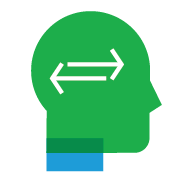The future workplace demands a combination of technical proficiency and interpersonal capabilities. Here are the top job skills employers will prioritize:
Digital literacy and tech savviness
Proficiency in emerging technologies such as artificial intelligence (AI), blockchain, and the internet of things (IoT) is becoming increasingly the most in-demand skill. Employees who integrate these technologies seamlessly into business processes will drive innovation and efficiency. Platforms like Mercer | Mettl’s Digital Readiness Assessment can help assess an employee’s capability to adapt to digital transformations.
Data analysis and interpretation
The ability to analyze and interpret complex data sets enables informed decision-making and strategic planning. Employers value professionals who can leverage data analytics to identify trends, optimize operations, and drive business growth.
Emotional intelligence (EQ)
High emotional intelligence facilitates effective communication, empathy, and conflict resolution, fostering a collaborative and productive work environment. Employees with strong EQ can navigate interpersonal dynamics and lead teams successfully.
Critical thinking and problem-solving
The capacity to critically evaluate situations and devise innovative solutions is essential in addressing complex business challenges. Employers seek individuals who can think strategically and implement effective problem-solving strategies.
Adaptability and resilience
In a rapidly changing business environment, adaptability and resilience are key to sustaining productivity and driving continuous improvement. Employees who embrace change and recover swiftly from setbacks contribute to organizational agility. Utilizing learning agility tools can help measure and develop these traits among employees.
Creativity and innovation
Creative thinking leads to developing new products, services, and processes, providing a competitive advantage. Organizations value employees who can generate innovative ideas and drive continuous improvement.
Leadership and team collaboration
Effective team leadership and collaboration are vital for achieving organizational goals. Employees who can inspire others, manage projects, and work cohesively in teams are highly sought after. Mercer | Mettl’s Virtual Assessment and Development Center provide tools to assess and develop leadership capabilities and team collaboration skills.
Cultural intelligence and diversity awareness
As workplaces become more diverse, understanding and respecting different cultures enhances teamwork and global business operations. Employees with high cultural intelligence can effectively navigate cross-cultural interactions, contributing to a harmonious and inclusive work environment.
Sustainability awareness
Awareness of sustainable practices and environmental responsibility is increasingly important. Employees who integrate sustainability into their roles contribute to corporate social responsibility goals and long-term organizational success.
Lifelong learning and curiosity
A commitment to continuous learning ensures that employees remain relevant and can adapt to new challenges. Curiosity drives personal and professional growth, leading to innovation and improved performance.










 Behavioral Competencies
Behavioral Competencies Cognitive Competencies
Cognitive Competencies Coding Competencies
Coding Competencies Domain Competencies
Domain Competencies























Would you like to comment?